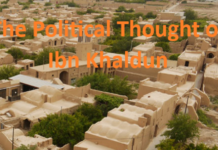Avicenna, the great Islamic philosopher and thinker, played a significant role in shaping Islamic philosophy, particularly political thought. Relying on his philosophical and epistemological foundations, he analyzes politics in connection with prophethood and the sacred intellect. In this article, we will examine various aspects of Avicenna’s political thought, illustrating how he perceives politics as an extension of prophethood and the divine intellect. Additionally, we will explore his perspective on the necessity of social cooperation and the establishment of justice.
1. The Connection Between the Prophet and the Sacred Intellect and His Role in Guiding Society in Avicenna’s Political Thought
Avicenna believes that the Prophet is a person who attains the highest level of human knowledge and is directly connected to the sacred intellect. He perceives truth not through external instruction but through direct reception from the Active Intellect. This makes the Prophet a possessor of an immediate knowledge that transcends ordinary human intellectual capacity.
Another key characteristic of the Prophet is his imaginative faculty. Unlike the common perception of imagination as something illusory or unrealistic, Avicenna considers the Prophet’s imaginative faculty as a crucial tool in guiding society. The Prophet is capable of presenting rational truths in symbolic and metaphorical language so that the general public can comprehend them. This is vital for guiding society because only the intellectual elite can grasp abstract and rational concepts, whereas the majority understand and accept them better through imagination and imagery.
On another level, the Prophet possesses a form of persuasive and compelling power that enables him to lead people toward the right path. Avicenna likens this persuasive power to a divine force that allows the Prophet to play the role of a political leader in society.
2. The Need for Human Cooperation and the Establishment of Justice and Social Order
Like many classical philosophers, Avicenna considers human beings to be political by nature (madani al-tabi‘). In other words, humans naturally require social life and cannot survive without it. However, what is significant in Avicenna’s political thought is why society is necessary and how it should be organized.
A) The Necessity of Society and Division of Labor
According to Avicenna, an individual alone cannot fulfill all his needs. The necessity of food, clothing, shelter, and security compels people to cooperate. This cooperation ultimately leads to the division of labor, meaning that each individual in society provides for some of the needs of others while simultaneously meeting his own needs through others.
However, this cooperation is only effective when it is structured within a coherent and just system; otherwise, chaos and disorder will threaten society. Avicenna believes that just as the human body has the heart and brain as its main organs to regulate bodily functions, society also requires a guiding system (i.e., government) that establishes justice and prevents corruption and disorder.
B) The Need for Law and Social Order
Since individuals have different desires and interests, conflicts of interest are inevitable in society. Avicenna asserts that without just laws and order, people would be drawn into conflict and chaos, ultimately leading to the collapse of social structures. Therefore, a political system that can enforce justice and establish the necessary laws to safeguard individual rights is essential.
Avicenna summarizes this necessity in three fundamental principles:
- Legislation based on reason and revelation – The law must be in accordance with rational principles while also being guided by divine revelation.
- Implementation of justice – Social justice must be upheld in all human relationships to prevent conflicts and disorder.
- Preservation of traditions and social values – Avicenna believes that for a society to endure, it needs traditions established by the Prophet or just rulers to prevent social deviation.
C) The Role of the Prophet in Establishing Social Institutions and Upholding Justice in Avicenna’s Political Thought
One of the most important aspects of Avicenna’s political thought is the Prophet’s role in establishing social institutions. Since humans need order, justice, and stable traditions to live together, the Prophet, as a lawgiver and just ruler, is responsible for creating these structures.
Avicenna believes that tradition and justice are the two essential pillars for the survival of society, and the Prophet is the one who teaches these to humanity. Traditions provide individuals with a framework for social behavior, and justice ensures that rights are protected and that society moves toward collective well-being.
Conclusion
By examining Avicenna’s views on prophethood and politics, we can see that he considers politics as an extension of prophethood. On the one hand, the Prophet, as a person connected to the sacred intellect, serves as the true leader of society; on the other hand, without law, order, and justice, society cannot survive. Therefore, Avicenna’s political philosophy is founded on two key dimensions:
- The Prophet’s connection with the sacred intellect and his role in guiding society – The Prophet, as the true leader, guides people through intellect, revelation, and imagination.
- The necessity of human cooperation and the establishment of justice and social order – Society cannot be sustained without justice and law, which are taught to people by the Prophet.
Ultimately, Avicenna’s political philosophy suggests that politics is not only necessary for maintaining human society but also serves as a means to achieve human happiness and fulfill the prophetic mission of guiding humanity toward perfection.




